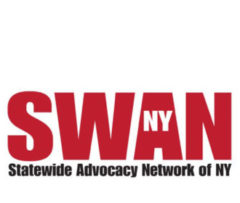- Recent data justify growth in OPWDD’s typically stagnant budget. Data collected through the Center for Disease Control’s National Health Interview Survey show 1 in 6 children (17.8%) diagnosed with at least one developmental disability in 2017 (increased from 16.2% in 2009).[1]
- Additional state funding must be made available to address the ongoing workforce crisis which continues to compromise continuity of supports and services for individuals with IDD within the nonprofit sector. According to National Core Indicators, the average turnover rate for Direct Support Professionals in New York State is 33 percent.[2]
- Additional, targeted state funding is necessary for high needs adult individuals with IDD who require a more acute level of care and are more at risk of being underserved, due to the increased labor and costs associated with their high level of need. Federal education funding legislation (H.R.4676) was recently introduced in the House of Representatives on for this very reason; to provide additional funding for schools who serve students with more complex needs.
- New York would be wise to pause and take a step back to assess its system transformation goals and benchmarks to; gather, analyze and publish data, establish strong, person centered quality measures, ensure consumer centered policies and create strong oversight measures. “The problems of MLTSS programs for people with IDD have caused states to rethink managed care as the model for IDD service system reform.”[3]
- The critical foundation for case management through Care Coordination Organizations (CCO) in New York is not fully operational, as technology and monitoring infrastructure systems are not yet in place. “Case management and supports coordination for people with IDD is often a much more significant and involved role than for many other populations.”[4]
- “While much research has been conducted on whether Managed Care delivery systems result in better outcomes than fee for service (FFS), there is no definitive conclusion as to whether managed care improves or worsens access to or quality of care for beneficiaries”.[5]
- Results of a recent survey of fifteen states that moved some Long Term Services and Supports for Individuals with Intellectual and Developmental Disabilities (IDD) to Managed Care Long Term Services and Supports (MLTSS) found that “most states did not realize a cost savings…” and that “there are no commonly accepted measures of quality” for the IDD population.[6]
- Additional state funding will be necessary to implement MLTSS for individuals with IDD; however, the cost-benefit analysis is not necessarily beneficial. “While there are savings achieved on long term supports and services claims, the amount of increased administrative expenditures outweighs savings from claims”.[7]
- Experience in other states has shown many challenges in successfully transitioning to MLTSS “… due to “lack of potential cost savings, limited experience serving people with IDD, limited state experience in setting managed care rates, need for meaningful quality measures, lack of managed care experience among providers, and the unique role of IDD case management and supports coordination…”[8]
- “Recent experiences in other states demonstrate that a focus primarily on cost savings, especially in the short-term is unlikely to result in success and may drive reductions in quality and/or service cuts that harm IDD beneficiaries.”[9]
- As major stakeholders, families and self-advocates play an integral role in the transformation of New York’s service provision for individuals with IDD and should be included in all stakeholder groups. “…Successful programs are most likely to result from careful planning, significant and ongoing engagement with stakeholders, and a clear policy vision intended to advance the goals of integrated, quality home and community-based services.”[10]
The State-Wide Family Advocacy Network of New York State is an independent coalition of like-minded organizations from around New York State, comprised of the families, guardians, and friends of people with Intellectual and Developmental Disabilities. Our mission is to educate and inform policy makers, the media and the public on issues impacting our disabled children and loved ones. SWAN is an
independent, all-volunteer organization
that receives no government or service provider money; its activities are
entirely self-supported.
[1] Official Journal of the American Academy of Pediatrics; Prevalence and Trends of Developmental Disabilities among Children in the United States: 2009-2017, October 2019; 144 (4) e20190811.
[2] Pg. 17, NASDDDS, Human Services Research Institute; National Core Indicators 2017 Staff Stability Survey Report. Jan 2019
[3] Pg 16, Center for Consumer Engagement in Health and Innovation; Service Disrupted: Managed Long Term Services and Supports Falling Short for Adults with Intellectual and Developmental Disabilities. November 2019
[4] Pg. 5, Health Management Associates; Current Landscape; Managed Long-Term Services and Supports for People with Intellectual and Developmental Disabilities, prepared for ANCOR. June 11 2018
[5] Medicaid and Chip Payment and Access Commission (MACPAC); Managed Care’s Effect on Outcomes
[6] Pg. 35, Intellectual and Developmental Disability Care Evaluation, University of Texas School of Public Health. December 31, 2018
[7] Pg 12, IDD LTSS Texas Health and Human Services Commission, Carve-In Cost-Effectiveness Evaluation Report. Deloitte, Jan11, 2019
[8] Pg 1, Health Management Associates; Current Landscape; Managed Long-Term Services and Supports for People with Intellectual and Developmental Disabilities, prepared for ANCOR. June 11 2018
[9] Pg 1, Health Management Associates; Current Landscape; Managed Long-Term Services and Supports for People with Intellectual and Developmental Disabilities, prepared for ANCOR. June 11 2018
[10] Pg 43, Health Management Associates; Current Landscape; Managed Long-Term Services and Supports for People with Intellectual and Developmental Disabilities, prepared for ANCOR. June 11 2018
SWAN-data-analysis-1-14-20-FINAL-VERSION